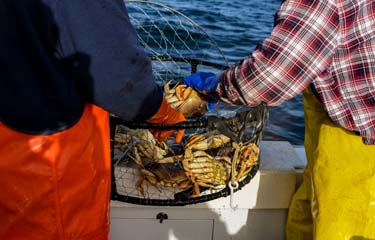West Coast Dungeness fishery navigates late start, pandemic

Domoic acid, price-haggling, and potential whale entanglement held up the Dungeness crab fishing up and down the West Coast this winter, further complicating a fishery already turned upside down by the pandemic.
Fishermen usually drop their pots from California to Washington in December, but did not start until January or February this season, depending on the state.
According to seafood distributor Tradex Food Inc, winter supply was met with existing freezer inventories of Dungeness, along with strong sales of king crab and snow crab.
Lori Steele, the executive director of the West Coast Seafood Processors Association (WCPSA), confirmed the processors her organization represents have largely moved freezer stocks out. Steele cited this as a positive – the energy to maintain freezer stocks is expensive and excess product drags prices down – but said it does not tell the whole story.
“Processors have had to repurpose a lot of product and change the packaging. We might take 10-pound bags of frozen crab parts that we would have sold a restaurant and repackage that into something a consumer would buy at the grocery store,” Steele told SeafoodSource.
Tradex President and CEO Rob Reierson said recent sales of Dungeness indicate that prices are going up, further supporting the narrative that freezer stocks are mostly cleared out. According to Tradex, lower supply may be putting upward pressure on the price as well. Besides the late start, total Dungeness harvest from Alaska to California has been trending down over the past three years.
According to figures compiled by Tradex, 2018 saw a harvest of 70.3 million pounds, with 67.5 million in 2019 giving way to just 50.3 million pounds last year. While figures are not yet available this season, anecdotal reports indicate slow fishing.
And while the seafood industry has touted crab as a pandemic success story – retail crab sales as a whole are up 60 percent, with king crab going for a record USD 28.00 (EUR 23.00) per pound – Steele said it has been a rough ride since January 2020, when live markets in China closed due to COVID-19 precautions, shutting off a lucrative export destination for West Coast Dungeness.
Then the coronavirus began spreading widely, further disrupting Asian markets before spreading havoc globally.
WCPSA represents large and small processors and seafood companies from Washington to California. Its members, which include Bornstein Seafoods, Ocean Gold Seafoods, Ocean Beauty Seafoods, Trident Seafoods, and Westport Seafoods, process most of the Dungeness crab, Pacific whiting, groundfish, and pink shrimp harvested on the West Coast.
Steele said these West Coast processors incurred massive costs at the onset of the pandemic to reformat their plants for social distancing and install health and safety productions. Now, the industry is getting slammed with challenges ranging from price wars to domoic acid shutdowns to increased regulations created to avoid whale interactions.
“We’re just running into one challenge after another in terms of recovering markets and rebuilding the fisheries. It’s going to take a while. We’re still in the middle of the pandemic,” Steele said.
The effects, she stressed, are long-lasting, and markets will not be rebuilt overnight. And it is not just the Dungeness crab market that’s suffering – Steele said markets for West Coast products like chinook salmon, sablefish, pink shrimp, albacore tuna, and whiting have all been undermined by the pandemic.
“Some processors closed temporarily or had to lay off many workers. Others had to consolidate or completely restructure their business plans to try to keep their doors open year-round,” Steele said.
Meanwhile, some WCPSA members have received federal aid, but companies in Washington have not seen a single dollar of CARES Act money from the first round of funding. Washington's CARES Act spend plan was approved in December, with distribution of funds scheduled to begin 23 May, 2021.
Photo courtesy of Photo_Time/Shutterstock






Share